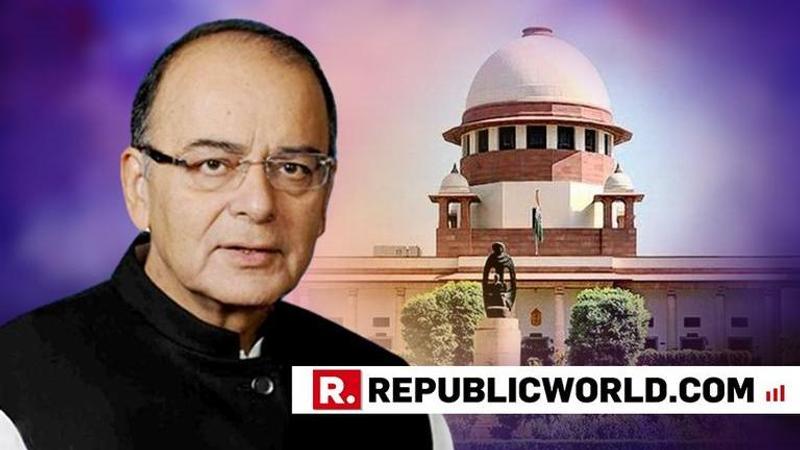Published 20:54 IST, January 25th 2019
"Bank defaulters cannot get away for long," says Arun Jaitley hailing the verdict as SC upholds Insolvency code, says defaulters' paradise is lost
With regard to the constitutional challenge to the definition of "related party", the bench said that "categories of persons who are collectively mentioned under the caption 'relative' obviously need to have a connection with the business activity of the resolution applicant".

"The defaulters' paradise is lost" and the economy's rightful position has been regained, the Supreme Court said Friday as it upheld the constitutional validity of the Insolvency and Bankruptcy Code (IBC) in its entirety.
The top court lauded the working of the IBC and said, "The flow of financial resource to the commercial sector in India has increased exponentially as a result of financial debts being repaid".
Speaking over the issue, Union Minister Arun Jaitley welcomed the decision of the Apex Court shared a series of tweets:
A bench of Justices R F Nariman and Navin Sinha refused to tweak any of the provisions of the IBC, which was challenged in a batch of petitions filed by several companies.
With regard to the controversial provision of section 29A of the IBC, which dealt with the rights of erstwhile promoters to participate in the recovery process of a corporate debtor, the bench said that "a resolution applicant has no vested right for consideration or approval of its resolution plan".
The court said the working of the Code is being monitored by an expert committee of the central government and in a short period, amendments have been carried out by involving all stakeholders.
"Earlier experiments, as we have seen, in terms of legislation having failed, 'trial' having led to repeated 'errors', ultimately led to the enactment of the Code. The experiment contained in the Code, judged by the generality of its provisions and not by so-called crudities and inequities that have been pointed out by the petitioners, passes constitutional muster," said Justice Nariman, who penned 150-page verdict for the bench.
It noted that approximately 3,300 cases have been disposed of by the adjudicating authority based on out-of-court settlements between corporate debtors and creditors which themselves involved claims amounting to over Rs 1.20 lakh crore.
The bench said 80 cases have been resolved, of which the liquidation value of 63 such cases is Rs 29,788 crores.
"These figures show that the experiment conducted in enacting the Code is proving to be largely successful. The defaulter's paradise is lost. In its place, the economy's rightful position has been regained," the bench said.
The court which was all praise with the working of the IBC said that to stay experimentation in economic things is a grave responsibility and denial of the right to experiment is fraught with serious consequences to the nation.
"We have also seen that the working of the Code is being monitored by the Central Government by Expert Committees that have been set up in this behalf. Amendments have been made in the short period in which the Code has operated, both to the Code itself as well as to subordinate legislation made under it. This process is an ongoing process which involves all stakeholders, including the petitioners," it said.
The bench said IBC is a code for re-organisation and insolvency resolution of corporate debtors and unless such re-organisation is effected in a time-bound manner, the value of the assets of such persons will deplete.
"Therefore, maximization of the value of the assets of such persons so that they are efficiently run as going concerns is another very important objective of the Code," it said.
On Section 29A, the bench said, "It is settled law that a statute is not retrospective merely because it affects existing rights; nor is it retrospective merely because a part of the requisites for its action is drawn from a time antecedent to its passing.
With regard to the constitutional challenge to the definition of "related party", the bench said that "categories of persons who are collectively mentioned under the caption 'relative' obviously need to have a connection with the business activity of the resolution applicant".
It said that in the absence of showing that such a person is "connected" with the business of the activity of the resolution applicant, such person cannot possibly be disqualified under provisions of IBC.
On NPAs, the apex court said that a Non-Performing Asset (NPA) refers to the account belonging to a person that is declared as such under guidelines issued by the RBI.
The court further said that a wilful defaulter, in accordance with the guidelines of the RBI, is a person who though able to pay, does not pay.
Dealing with one-year period and the NPAs, the bench said, "A person is a defaulter, when an installment or interest on the principal remains overdue for more than three months, after which, its account is declared NPA.
"During the period of one year thereafter, since it is now classified as a substandard asset, this grace period is given to such person to pay off the debt."
The bench added that prior to this 15 month period, banks and financial institutions do not declare the accounts of corporate debtors to be NPAs.
"This policy cannot be found fault with. Neither can the period of one year be found fault with, as this is a policy matter decided by the RBI and which emerges from its Master Circular, as during this period, an NPA is classified as a substandard asset," the court said.
The bench also upheld the classification between the financial creditor and operational creditor in IBC and said it is neither discriminatory nor arbitrary and non-violative of Article 14 of the Constitution.
(Edited by digital desk)
Updated 21:07 IST, January 25th 2019




